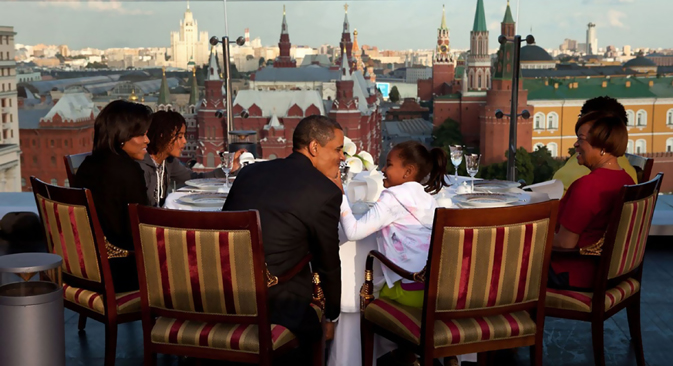Russia Direct presents its first-ever ranking of Russian studies programs in US

U.S. President Barack Obama with his family during his visit to Moscow in July, 2009. Source: White House / Pete Souza
On April 8, Russia Direct releases its comprehensive Ranking of Russian and Post-Soviet Studies in the U.S., covering 32 programs at American universities. The Ranking is an attempt to revive interest in Russia within the U.S. and improve relations between two countries. This is especially important, given the Ukrainian crisis and the geopolitical standoff between the two nations, which some experts are calling a “new Cold War.”
At this time, Russia Direct focuses on Master’s level degree programs that provide advanced professional training and prepare students for work in government, business and international organizations.
Harvard’s Davis Center for Russian and Eurasian Studies is recognized as the best Russian Studies program in the U.S., followed by University of Wisconsin – Madison, Columbia, University of Illinois at Urbana-Champaign and Stanford.
The methodology is a result of discussions with different academics and experts in Russian Studies, including Dan Davidson, president and co-funder of the American Council for International Education, and Viktoria Zhuravleva, vice-director of the Department of International Relations and Area Studies at the Russian State University for the Humanities.
The ranking is based on six important criteria: average U.S. university ranking (based on the Shanghai, QS and Times Higher Education rankings), study abroad and exchange opportunities, academic competitiveness and research, reputation (based on peer review surveys of educators and employers), future employment prospects and Title VI center status (federal grants for universities’ National Resource Centers and Foreign Language and Area Studies Fellowships).
In addition, the ranking brings together insights of experts from U.S. think tanks, former U.S. Department of State officials, advisors and those academics directly involved in teaching Russian Studies programs for American students and creating the curriculum.
Among them are Alexandra Vacroux of Harvard, Angela Stent of Georgetown, Jeffrey Mankoff of the Center for Strategic and International Studies, Anna Vassilieva of the Middlebury Institute of International Studies, Alexander Abashkin of the Moscow School of Social and Economic Sciences, and Nicolai Petro of the University of Rhode Island.
Experts agree that such a Ranking is very timely and relevant given the sharp decline in U.S.-Russia relations and increasing distrust between two countries spurred by the Ukrainian crisis.
“The Ranking is quite timely considering the current turbulence in U.S.-Russian relations,” said Michael Kofman, Public Policy Scholar at the Wilson Center’s Kennan Institute.
Zhuravleva gives two reasons why this project is important: “First, the decline in expertise on Russia in the United States; second, the urgent need for multifaceted research into post-Soviet Russia.”
“An advantage of the ranking is its international look which is partly due to the project’s goals, aimed at reviving interest in Russian Studies in the U.S. and establishing a dialogue between the two countries' expert and academic communities,” she said. “The selected parameters present a clear view of the dynamics of Russia-related academic study in U.S. universities.”
“Russia Direct’s rankings provide a useful service to young scholars who are considering pursuing graduate work in the field of Russian studies... Hopefully the rankings will help shine a light on the important, challenging and rewarding subject that is Russia,“ said James Carden, a contributor to The National Interest and the Moscow Times, and a former advisor to the U.S.-Russia Presidential Commission at the U.S. State Department.
Stanislav Tkachenko, professor at St. Petersburg State University, agrees and argues that the ranking and its methodology are devised with “obvious care and meticulous attention.” However, Zhuravleva points out that the representativeness of the data is “still a lingering issue” and doesn’t take into account two more important criteria: the number of visiting Russian scholars teaching within Russian Studies programs, and their interdisciplinary level.
What are the best Russian Studies programs in the U.S.? How did we go from Soviet Studies to Russian Studies? How deep is the Russian Studies bench? How to improve the field of Russian Studies? How are the debates on Russia and the Ukrainian crisis in the White House reverberating within academia? Subscribe and download the full version of the report to find out. The report is available only for subscribers.
All rights reserved by Rossiyskaya Gazeta.
Subscribe
to our newsletter!
Get the week's best stories straight to your inbox